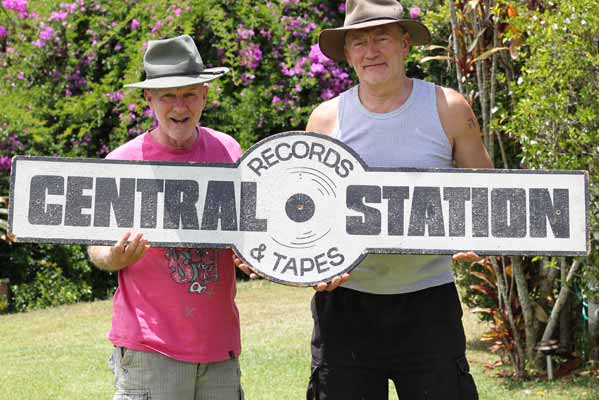The history of Central Station Records is nothing less than a David & Goliath battle of epic proportions.
Owners Giuseppe ‘Jo’ Palumbo and Morgan Williams waged a 40-year legal war against the distribution monopoly over the music industry held by the then ‘Big Six’ major record companies, effectively bringing dance and electronic music to Australia in the process.
With Central Station now established as a recording label, Jo and Morgan have decided to tell their side of the story in a new book, ‘Music Wars: The Untold Story Of Central Station Records’. “I think we have overcome all the political and economic barriers and we feel that we’re getting old and now is the time to do it,” Jo says.
“I used to have to go to radio stations with my bag full of CDs or VHS tapes to take to 'Rage' or 'Video Hits'... of course they're doing it all electronically now.”
“Central Station is having success worldwide and we are quite happy with their performance. We decided, we just want to put the record straight and let people know how hard we fought to get to where we are, and also as an inspiration for people to read the book and get some idea that sometimes, even under the worst scenario, you can succeed and achieve – you have to have a bit of faith.”
In an age of streaming and digital distribution, it may be hard to imagine a time when it was almost impossible – even illegal – to import records not made available by the major companies.

Chapel St store (Melbourne) circa 1984 - image supplied
When Jo entered the business as a retailer in the 1970s, the Australian music market was suffocated by a draconian Federal Copyright Act (1968) that placed severe restrictions and penalties on such imports. “It was in 1968 the Federal government introduced a copyright law which restricted the importation of music, books and films,” Jo explains.
“It meant that if you didn’t have a licence for it you couldn’t import it. By importing it you broke the copyright law in several sections and you could face criminal charges, jail and a heavy penalty.”
The ensuing legal battle Jo and Morgan embarked on paved the way for a new frontier in music distribution and led to the changing of the laws in 1998. But by then, Morgan says it came as a hollow victory. “By the time they changed the laws in the late '90s we'd become established with our own label,” he says.

Central Station Album Charts circa 1993 - image supplied
“We were dealing with independents overseas and everyone was exhausted, the majors were exhausted, everybody was well overdue for change and it was a what they call a pyrrhic victory [one in which the victor's losses are as great as the defeated], it came too late to be effective. Of course now with the digital economy, it's laughable – absolutely laughable – that we even had to fight that fight.”
Jo adds: “There was no other alternative, we had no choice. Either you fight on like we did or you desist and do something else and that's what a lot of labels in Australia did: they shut down, they went away, they diversified.
“The way the copyright law was, was restricting a lot of labels from evolving. But what the copyright law has allowed is for us to invest money into local productions. If you produce you're own product like Central Station does, and most labels do, you control your own copyright and you can do whatever you like.”
‘Music Wars’ is an in-depth history of Central Station and the key people who worked tirelessly to cultivate its reputation as a pillar of the dance and electronic music scene in Australia. Both Jo and Morgan are among a thinning breed of industry players who survived the transition from analogue to digital technology, an advance that affected all parts of the music business; from how it was made to how it was bought and sold.

Central Station Records Adelaide store circa 1993 - image supplied
“In the early days, our store buyers would ring Europe or America in the middle of the night and they would hear songs over the telephone,” Jo explains, “and they would buy 12-inch singles over the telephone on the basis of what they were being played by the sales people in Italy or Spain or wherever.
“Of course the other technology we used in the late ‘70s was Telex machines, which is almost a step-up from Morse code.”
Morgan adds: “We go into our label offices in Sydney now and there's a room full of young people on computers and we have no idea what they’re doing, but in the old days I used to have to go to radio stations with my bag full of CDs or VHS tapes to take to 'Rage' at ABC or 'Video Hits' at Channel Ten, and of course they're doing it all electronically now.”
“The other thing I noticed,” Jo continues, “is that all the artists go to the Central Station office, put all the laptops out and start creating music. They share the music within the network as they're creating it so, wow, it's all digital.”

